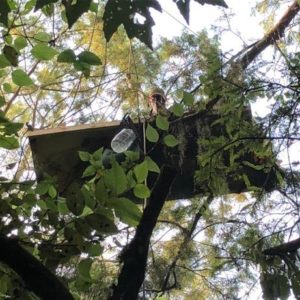As the summer comes to an end, the Bayou Bridge pipeline is nearing completion. Work continues along the full stretch of the pipeline, which will carry crude oil from a terminal in Lake Charles, La. to refineries in St. James, La. Protesters have been escalating their attempts to delay construction, engaging in “kayaktivism,” tree sits, and other disruptive behaviors to stymie construction work in its final days. Arrests last weekend show both how the protest has become disconnected from Louisiana residents, and how understandings of state law differ between protesters and energy infrastructure supporters.
On August 1, a Louisiana state law raised the stakes for trespassing on a “critical infrastructure” area, changing the offense from a misdemeanor to a felony. It further classifies pipelines and pipeline construction areas as such sites. Energy Transfer Partners (ETP), the company building the Bayou Bridge pipeline, says that it did not lobby for the law change, but appreciates the legislature’s efforts to support the industry.
The law may have already changed protesters’ tactics. They are now careful to stress that they stayed on private land, rather than entering the pipeline easement. Even so, disagreements over where to draw the line between company land and private land remain.
“They are still in the process of taking that land. The court day isn’t even until November 27th,” said Karen Savage, an environmentalist journalist with a tendency to get caught up in the action, in an interview. She was arrested along with several other protesters last weekend. They claim that they were on private property and had the owners’ permission to be there.
ETP, though, has a different interpretation of events, calling the protesters’ actions trespassing.
“Additionally, any entry on our right-of-way by those not associated with our project are trespassing. These situations are dealt with by local law enforcement,” Alexis Daniel, an ETP representative, told InsideSources.
After months on the ground, the group of protesters numbers only around a dozen people, though even that fluctuates from week to week. According to the arrest records from the St. Martin Sheriff’s office, many of those who continue to resist construction are not native Louisianans. Out of the four people listed in the sheriff’s booking records for last weekend, only one was from Louisiana. The others came from Oregon, New York, and Mississippi.
For the past several weeks, protest activity has used creative ways to try to impede progress. Protesters hung “sky pods” in the trees, stringing key support ropes down onto the easement. Cutting these ropes threatens to send the protestor crashing down from the treetop. Leaving the line uncut, meanwhile, interferes with construction progress.
All of this was by design, explained Savage.
“Water protectors told me that they had done this intentionally to prevent work from happening,” she said.
At this juncture, law enforcement seems prepared to treat these protest actions as arrestable offenses, even if they do not amount to trespassing. One lawyer working with the protesters told the Intercept that he was hopeful that a constitutional challenge would stop other states from issuing similar laws.
That couldn’t occur fast enough to help today’s protesters though.
According to ETP, the protesters’ actions had not, so far, resulted in any changes to the pipeline’s projected October completion date.

